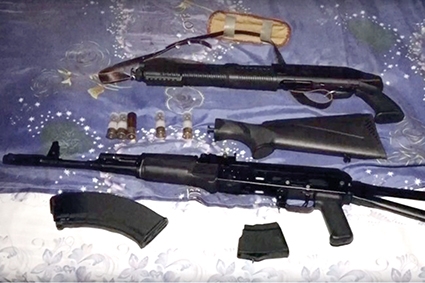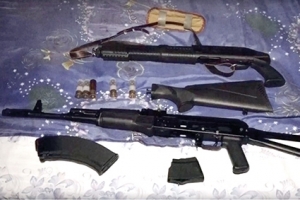Neo-Nazi Group Leader Facing Prison
Giorgi Chelidze, the leader of Neo-Nazi group National Unity of Georgia, was arrested last Saturday by Georgian police for the illegal purchase, storage and carrying of firearms. He faces up to six years in prison and is currently being held in pre-trial detention.
After his residence was searched by police, they found several illegal firearms as well as 28 rounds of ammunition. Prosecutor’s claimed on Monday that Chelidze had removed a sink in the bathroom of his house and attempted to dispose of evidence by dropping the bullets down the drain, but was caught in the act by police. Tbilisi City Court remanded Chelidze in custody on Monday afternoon pending his trial. His attorneys have demanded his release on bail at 1000 GEL (around $400)
“It’s been like this since I founded the organization and started spreading my ideas: this is an attempt to silence me. The investigation proves there is none of my DNA on the ammunition,” said Chelidze after the hearing.
Authorities launched an investigation into the National Unity of Georgia after they published a series of videos on August 31, showing Chelidze and a group of men wearing the group’s armbands and firing an assault rifle at an unknown outdoor location. Prior to his arrest, however, Chelidze posted on Facebook assuring people he was not keeping any illegal weapons at home and therefore would not face any legal issues.
Monday in court, Chelidze claimed that his only crime was his love for the country, nation, and state. His lawyer downplayed the accusations that Chelidze was a fascist, a term Chelidze frequently self-identifies with, and claims that it is a Latin word meaning ‘unity’. He also claimed that the armbands members of the group wear were borrowed from Georgian ethnography. The armbands were also worn at court on Monday.
The National Unity of Georgia has gained visibility in recent years, mostly due to their threats of violence and videos posted online of members posing with guns. In April, the group published a video on Facebook in which two members called for support for those who defend their territory, referring to a violent incident on April 8 between a group of Nigerian students and other local residents in Tbilisi.
The April video also led to a police investigation after public outcry, however, it ended after authorities claimed the pistols which were visible in front of the speakers in the video were pneumatic. Another investigation into the group in May, after threatening statements were made against participants of the rally protesting the police raid on nightclubs, also resulted in no charges.
During counter-protests on 12–13 May co-organized by the group, they vowed to form detachments against drug dealers and LGBT propagandists while chanting death to the enemy and giving Nazi salutes. On International Day against Homophobia, Transphobia, and Biphobia, several leaders of the National Unity of Georgia were questioned for several hours at a police station over alleged threats they had made towards queer rights activists.
“We have black shirt groups for such cases. It is a prepared squad that can be involved in such confrontation in accordance with the law. We, who are now here, are true Georgians. We are starting to form troops and we are ready to protect our country from drug dealers and LGBT propagandists who will not be able to form an agenda in Georgia. The agenda belongs to us. Death to the enemy,” Chelidze said during the counter protest.
The group marched through Tbilisi that day under a heavy police presence, giving Nazi salutes despite being warned by the State Security Service not to use Nazi symbols in public. According to the Liberty Charter adopted in 2011, it is illegal to publicly display communist or fascist symbols.
Following these events in May, Interior Minister Giorgi Gakharia acknowledged there were shortcomings in the current legislation, describing it as “not very effective” against aggressive and fascist-leaning groups, however, no legal changes have since been publicly announced.
Many Georgian rights groups have criticized the government for not handling these situations with radical groups properly, insisting that the authorities should act more harshly when they continuously make direct threats towards others and incite violence.
By Shawn Wayne












